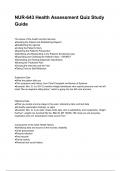NUR-643 Health Assessment Quiz Study
Guide
The series of the health records interview
●Greeting the Patient and Establishing Rapport
●Establishing the Agenda
●Inviting the Patient's Story
●Exploring the Patient's Perspective
●Identifying and Responding to the Patient's Emotional Cues
●Expanding and Clarifying the Patient's Story - OPQRST
●Generating and Testing Diagnostic Hypotheses
●Sharing the Treatment Plan
●Closing the Interview and the Visit
●Taking Time for Self-Reflection
Subjective Data
●What the patient tells you
●The symptoms and history, from Chief Complaint via Review of Systems
●Example: Mrs. G. Is a 54-12 months-vintage hairdresser who reports pressure over her left
chest "like an elephant sitting there," which is going into her left neck and arm.
Objective Data
●What you locate at some stage in the exam, laboratory data, and test data
●All bodily examination findings, or signs
●Example: Mrs. G. Is an older, obese white lady, who is satisfactory and cooperative. Height
five′four″, weight one hundred fifty lbs, BMI 26, BP 160/80, HR ninety six and everyday,
respiration price 24, temperature ninety seven.Five °
Components of the Adult Health History
●Identifying data and source of the records; reliability
●Chief grievance(s)
●Present infection
●Past records
●Family history
●Personal and social history
, ●Review of structures
The Silent Patient
Be attentive and respectful, and encourage the patient to continue while prepared.
Watch the patient intently for nonverbal cues, consisting of difficulty controlling emotions.
Being comfy with periods of silence may be healing, prompting the affected person to show
deeper feelings.
The Confusing Patient
Just as you expand a differential diagnosis from the symp-toms of the Present Illness, hold
numerous possibilities in mind as you investigate why the story is perplexing. It may be the
patient's fashion, and through the use of your competencies of guiding questions, clarification,
and summarizing, you may prepare a coherent story. Watch for an underlying trouble, however,
that is interfering with communique.
Consider delirium in acutely ill or intoxicated sufferers and dementia inside the elderly. Their
histories are inconsistent and dates are difficult to comply with. Some may additionally even
confabulate to fill inside the gaps in their recollections.
If you suspect a psychiatric or neurologic sickness, amassing a detailed history can tire and
frustrate both you and the affected person. Shift to the intellectual popularity exami-state,
specializing in degree of cognizance, orientation, memory, and capacity to apprehend. You can
ease this transition by means of asking questions like "When turned into your ultimate
appointment at the sanatorium? Let's see . . . That become approximately how lengthy in the
past?" "Your address now could be . . . ? . . . And your smartphone variety?" You can confirm
these responses within the chart or ask permission to speak with circle of relatives contributors
or buddies to reap their perspectives.
The Patient with Altered Cognition
Under these occasions, you will need to acquire historic information from different sources
which include own family individuals or caregivers. Always are seeking for the nice-informed
source. Apply the basic principles of interviewing on your conversations with loved ones or pals.
Find a private area to talk. Introduce your self, nation your reason, inquire how they're feeling
below the situations, and recognize and renowned their worries. As you pay attention to their
debts, examine their credibility in light of the fine of their relationship with the affected person.
Establish how they know the affected person. For example, while a infant is added in for health
care, the accompanying adult might not be the discern or caregiver, however just the most to be
had driver. Remember that while you're amassing records approximately the records, you
should now not expose facts approximately the patient unless the informant is the fitness care
proxy or has a durable energy of attorney for health care, or you have got permission from the
patient.




